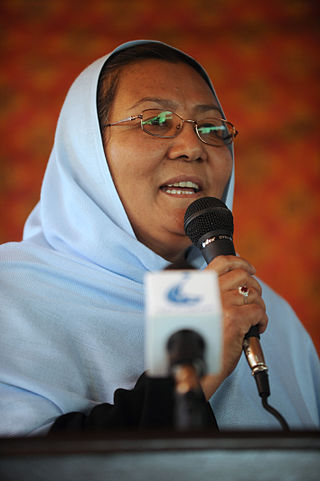This article needs additional citations for verification .(August 2016) |
This is a list of the governors of the province of Kunduz , Afghanistan.
This article needs additional citations for verification .(August 2016) |
This is a list of the governors of the province of Kunduz , Afghanistan.
| Governor | Period | Extra | Note | ||
|---|---|---|---|---|---|
 | Sahib Jan Sahraye | ~1978 August 1978 | |||
 | Qari Rahmatullah | ~1993 | |||
 | Arif Khan | - 2000 | Assassinated in 2000 in Peshawar, Pakistan | ||
 | Abdul Latif Ibrahimi | 2002 2004 | |||
 | Mohammad Omar | 2004 October 8, 2010 | Assassinated on 8 October 2010 when attending Friday prayers in Taloqan, Takhar province | ||
 | Muhammad Anwar Jigdalak [1] | 2010 2012 | |||
 | Ghulam Sakhi Baghlani [2] | 2013 2014 | |||
 | Mohammad Omar Safi [3] | 2014 October 29, 2015 | fled to London after Kunduz City fell to Taliban insurgents. [3] | ||
 | Asadullah Omarkhel | 9 February 2016 ? | head of Kunduz high peace council | ||
 | Nisar Ahmad Nusrat [4] | 7 November 2021- 3 March 2024 | |||

Colonel Sir Thomas Robert Gore Browne was a British colonial administrator, who was Governor of St Helena, Governor of New Zealand, Governor of Tasmania and Governor of Bermuda.

Gul Agha Sherzai, also known as Mohammad Shafiq, is a politician in Afghanistan. He is the former governor of Nangarhar province in eastern Afghanistan. He previously served as Governor of Kandahar province, in the early 1990s and from 2001 until 2003. In October 2013, Sherzai resigned from his post as governor and formally announced himself as a candidate for Afghanistan's 2014 Presidential Election, and served as the minister of border and tribal affairs until the Taliban victory in 2021.

Afghanistan is divided into 34 provinces. The provinces of Afghanistan are the primary administrative divisions. Each province encompasses a number of districts or usually over 1,000 villages.

Dr. Habiba Sarābi is a hematologist, politician, and reformer of the reconstruction of Afghanistan after the Taliban first took power. In 2005, she was appointed as Governor of Bamyan Province - the first Afghan woman to become a provincial governor. She had served as Afghanistan's Minister of Women's Affairs and as Minister of Culture and Education. Sarabi was instrumental in promoting women's rights and representation and environmental issues. She belongs to the ethnic Hazara people of Afghanistan. Her last name is sometimes spelled Sarobi.
Surkh-Rōd.(Pashto/Persian: سرخرود/ سره رود), also spelled as Surkh-Rūd or Sorkh-Rūd, also called Sra-rod or Sra- road, is a district in the north of Nangarhar Province, Afghanistan. The district centre is the town of Sultanpur. It is well known to locals because of its abundance of fertile land; however, it is currently facing a lack of water.
Hakim Taniwal was the governor of Paktia province in Afghanistan until he was killed by a suicide bomber on 10 September 2006, at the age of 60. Prior to his governorship of Paktia, Taniwal had governed the province of Khost, near the border with Pakistan, where al-Qaeda had established training camps during the time of the Taliban and later took refuge in the Tora Bora mountains.
Hajji Din Mohammad also known as Azizullah Din Mohammad is a politician in Afghanistan who served as the Governor of Nangarhar Province followed by Governor of Kabul Province. He is currently the Chairman of Peace and Development Islamic Party. He has been involved in the peace and reconciliation process between the Afghan Government and the Taliban and is currently the deputy of High Council for National Reconciliation. Haji Din Mohammad comes from a distinguished Pashtun family "Arsala" The Arsala family is part of the Jabar Khel. He is also the elder brother of late Hajji Abdul Qadir and Abdul Haq His great-grandfather, Wazir Arsala Khan, served as Foreign Minister of Afghanistan in 1869. One of Arsala Khan's descendants, Taj Mohammad Khan, was a general at the Battle of Maiwand. Another descendant, Abdul Jabbar Khan, was Afghanistan’s first Ambassador to Russia.

Alakozai is a Pashtun tribe in Afghanistan. They are one of the four tribes of the Zirak tribal confederacy of Durrani Pashtuns.
Atiqullah Ludin was the Governor of Logar Province, Afghanistan in 2008–2013. He is originally from Mohammad Agha District of Logar.
Hamidullah Qalandarzai was born in Surkh Rod district of Nangarhar Province, Afghanistan. He is the former governor of Khost Province, replacing Arsala Jamal.

Daud Shah Saba is a politician in Afghanistan, who served as Governor of Herat Province from August 2010 to July 2013 when his predecessor Ahmad Yusuf Nuristani had resigned from the post.

Ahmadullah Alizai is a politician in Afghanistan who served as a ministerial advisor to the President. He has worked as Governor of Badghis and Governor of Kabul Province. He previously served as the Deputy Governor of Kabul Province, Deputy Governor of Nangarhar Province, and as Director of Counter-Narcotic directorate for the south-west zone.
On 10 January 2017, multiple bombings in Afghanistan occurred at government and tribal establishments during the renewed War in Afghanistan. The Taliban claimed responsibility for all but one of the attacks, which targeted a United Arab Emirates diplomatic mission. In total, at least 64 to at least 88 people were killed and at least 94 were wounded, with at least three attackers also being killed. Other attacks may have taken place.